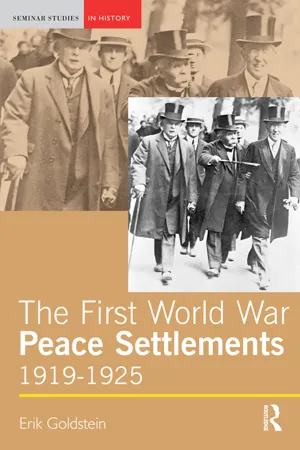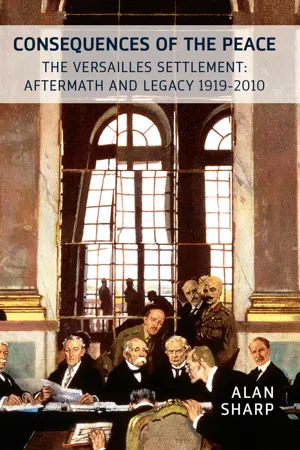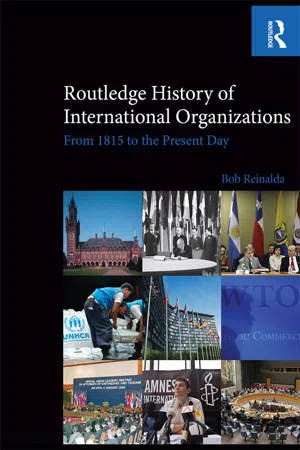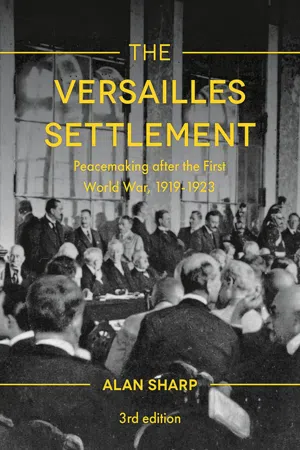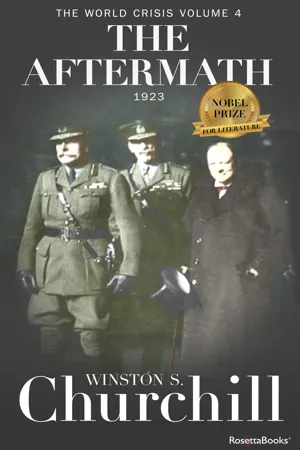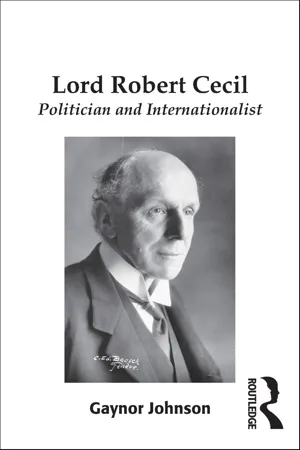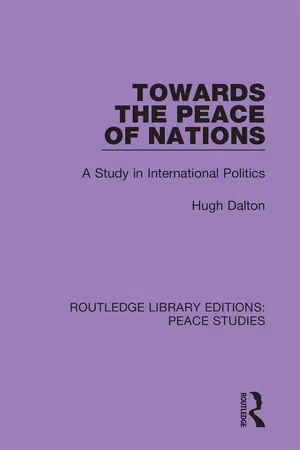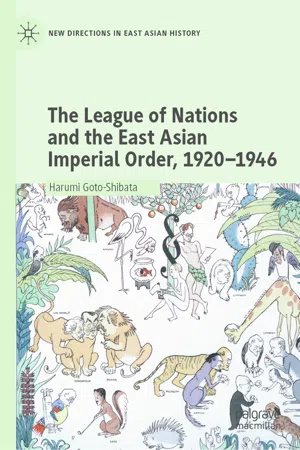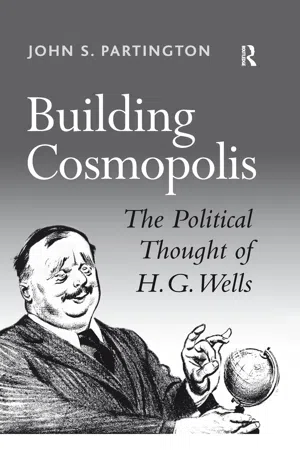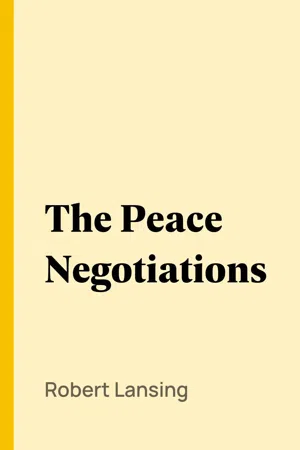History
League of Nations
The League of Nations was an international organization established after World War I with the goal of promoting peace and preventing future conflicts. It aimed to achieve this through collective security, disarmament, and negotiation. Although it faced challenges and ultimately failed to prevent World War II, the League laid the groundwork for the establishment of the United Nations.
Written by Perlego with AI-assistance
Related key terms
10 Key excerpts on "League of Nations"
- eBook - ePub
- Erik Goldstein(Author)
- 2013(Publication Date)
- Routledge(Publisher)
Chapter Four The League of NationsDOI: 10.4324/9781315840703-4The horrors and vast scale of the First World War spurred the development of ideas for ways to prevent the recurrence of conflict. Interest in some form of general international organization had been discussed by several generations of publicists.1 The collapse of the old concert system, combined with hopes of creating lasting peace and security, now impelled the Allied powers to convert these proposals into policy. By the time the Armistice was signed it was clear that the creation of a League of Nations would be part of any peace settlement. Woodrow Wilson had called for such an organization in the Fourteen Points [Doc. 3], as had Lloyd George in his Caxton Hall speech of January 1918 [Doc. 2] when he declared the creation of a similar body as being among Britain’s three preconditions for establishing a permanent peace. The French government had also been working on plans for an international organization.The concept of a League of Nations grew out of several earlier developments. In the seventeenth and eighteenth centuries philosophers such as William Penn and Emmanuel Kant, among others, had proposed schemes for perpetual peace. The nineteenth century saw substantive steps to promote international peace, one of which was the search for mechanisms to prevent war. This effort reached a critical stage at the Hague conferences of 1899 and 1907, which sought to establish judicial mechanisms for resolving conflict. A second step was the growth of international organizations that promoted international cooperation, beginning with the Universal Postal Union in 1875. While non-political, they provided evidence of the efficacy of international cooperation. The Allied experience of wartime cooperation through joint Allied commissions controlling raw materials, shipping and trade provided further evidence of the utility of cooperation. An added factor was that many blamed the secret diplomacy of the prewar era for the drift to war and Wilson had proposed that the solution to this was Open Diplomacy. It was envisaged that the League would provide a forum for such open diplomacy, where all treaties and agreements between states would be deposited and published. During the war public pressure groups emerged to support the idea, such as the League to Enforce Peace in the United States and the League of Nations Society in Britain. - eBook - ePub
The Consequences of the Peace: The Versailles Settlement
Aftermath and Legacy 1919-2015
- Alan Sharp(Author)
- 2015(Publication Date)
- Haus Publishing(Publisher)
3The League of Nations and the United Nations
‘What are the purposes that you hold in your heart against the fortunes of the world?’Woodrow Wilson1The 20th century witnessed two attempts to create a new order in international affairs, the League of Nations after the First World War and the United Nations Organization in the wake of the Second. Inevitably each was much influenced by the circumstances in which it originated but there was a real ambition on both occasions to produce an institution that would inhibit, if not prevent, mankind from resorting to war – a task that took on added urgency after the explosion of atomic bombs on Hiroshima and Nagasaki in August 1945 announced the arrival of weapons which really did have the capacity to destroy life and civilizations on a global scale. In many ways, however, the nuclear age was only the realization of fears which the inter-war period also entertained. The British government’s grossly inflated pre-1939 estimates of the scale of civilian casualties expected from sustained German bombing, probably also using gas and chemical weapons, were already little short of cataclysmic.There was thus a determination, after both these unprecedentedly destructive conflicts, to establish structures and codes of conduct that would encourage alternative modes of dispute resolution. The League did not fulfil the expectations of its advocates, which were overambitious and unrealistic, yet the great powers still established a replacement after the Second World War. In its turn, the United Nations has also suffered disappointments and experienced frustrations when rendered powerless by the determination of the major powers either to block the initiatives of rivals or to act independently. Nonetheless, despite their inability to deliver the world peace their most hopeful supporters envisaged, both the League and UN have helped to transform the norms and conduct of international relations and represent a remarkable evolution from pre-1914 diplomacy. - eBook - ePub
Routledge History of International Organizations
From 1815 to the Present Day
- Bob Reinalda(Author)
- 2009(Publication Date)
- Routledge(Publisher)
Part VILaying down the path of collective securityThe First World War, the League of Nations founded (1919) and the interwar period
The sixth part deals with the First World War and the interwar period. The war caused a break in the development of international organizations after the ‘long’ nineteenth century (until 1914), but it also involved a new initiative. The founding of a ‘League of Nations’ was widely discussed during the war by both citizens and politicians and became part of the institutional strategy devised by the US. The outcome of that strategy was, however, determined not by the US, but by the balance of power between the principal victors at Versailles, where the Covenant of the League of Nations was drawn up (Chapter 15 ). The League proved to be a suitable medium to restore relations in places where measures had been taken during the peace negotiations, but where acute tensions still existed. This resulted in arrangements such as temporary administration, conflict settlement and the accommodation of large numbers of refugees. Efforts to disarm, however, remained the domain of the great powers, despite attempts by the League of Nations to play a part. The League had barely any grip on the political and military developments of the 1930s because the great powers took little notice of it (Chapter 16 - eBook - ePub
The Versailles Settlement
Peacemaking after the First World War, 1919-1923
- Alan Sharp(Author)
- 2018(Publication Date)
- Bloomsbury Academic(Publisher)
© Alan Sharp 2018 Alan Sharp The Versailles Settlement The Making of the Twentieth Century https://doi.org/10.26777/978-1-137-61141-3_3Begin Abstract3. The League of Nations
End AbstractAlan Sharp1(1) School of History and International Affa, University of Ulster (Coleraine) School of History and International Affa, Coleraine, United KingdomThere are few better illustrations of the complexities and paradoxes of peacemaking in 1919 than the ideas and negotiations that combined to produce the Covenant of the League of Nations. Seeking to build upon past experience but also attempting to create a new framework for diplomatic activity, the League represented a revolutionary basis for future international stability. It sought to limit the untrammelled exercise of national sovereignty that had allegedly characterised the ‘international anarchy’ of 1914, yet it stopped far short of supranational power. It thus embodied the paradox of an attempt to combine collective security with the continued existence of national sovereignty. In theory based on the idea of equality among nations but in practice controlled by the great powers, it aimed at producing a peaceful world by threatening a determined aggressor with, as a last resort, war. Designed to guarantee the territorial integrity and political independence of its members but also to permit peaceful changes to frontiers and treaties that had become inappropriate, the League is an apt symbol of the idealism, vision, complexities and contradictions of the ‘new diplomacy’. - eBook - ePub
- Winston S. Churchill(Author)
- 2013(Publication Date)
- RosettaBooks(Publisher)
It was agreed that a special Commission upon the Constitution of the League of Nations should be appointed by a Plenary Session of the Conference. The discussions in the Council of Ten, at which this procedure was settled, are instructive reading. President Wilson, hitherto the champion of the smaller Powers, had already realised that no business would be done if any large number of them were allowed to sit upon the Commission of the League. He therefore argued for the smallest possible body composed of representatives of the highest responsibility. Clemenceau and Lloyd George, on the other hand, somewhat ironically voiced the claims of the smallest nations. The League was to be their shield and buckler. Ought they not to be there? Would this not open to them a useful sphere of activity instead of leaving them to loaf morosely about Paris waiting for the decisions of the Council of Ten? All the Great Powers except the United States were profoundly disquieted at the total lack of progress, and their representatives had to face a rising menace of impatience at home. While the main questions were unsettled, every aspect of the League of Nations’ Constitution would have to be vigilantly scrutinised. They regarded with despair the prospect of so many weeks’ or even months’ delay.In the end a very good Commission was appointed which included some of the smaller nations and yet was not unmanageable in numbers. The two foremost British champions of the policy, Lord Robert Cecil2 and General Smuts, were appointed delegates. Wilson himself decided to preside, and the immense task was vigorously taken in hand.The history of the Peace Conference, edited by Dr. Temperley and published under the auspices of the Institute of Foreign Affairs, attributes the origin of the League of Nations to three reasons. First, the need of some settled Council of Nations which would be responsible for the maintenance of peace; secondly, the need for a more comprehensive guarantee of the safety of small nations, as proved by the fate of Belgium; and thirdly, a growing belief in the advantages of economic co-operation. An additional argument might be found in the fact that twenty million men had been blowing each other to pieces for more than four years, that this process had now stopped, and most people hoped it would not begin again.It is sometimes pretended that the League of Nations was an American inspiration forced and foisted upon Europe against its froward inclination. The facts are different. The idea had stirred in most civilised countries during the last three years of the war, and various societies had been formed to propagate it both in America and in England. Lord Robert Cecil was the first Englishman to put something down in writing, and he wrote a paper on this subject at the end of 1916. His thesis, though necessarily undeveloped, amounting indeed only to a rough draft of what now forms Articles XV and XVI of the Covenant, provided a basis for a Committee set up in 1917 under Lord Phillimore’s presidency to work upon. This Committee produced draft statutes of a League in a document circulated to the United States among other Governments early in 1918. In the summer of 1918 President Wilson deputed Colonel House to work upon the Phillimore draft and House’s suggestions reached him on July 16. The main addition made by House was the positive guarantee of the territorial integrity and independence of the States members of the League. Phillimore’s draft had been content merely to provide guarantees for the execution of arbitration agreements. When Wilson came to revise this he omitted the clause providing for an International court but added tremendous words, indeed such words as Lord Robert Cecil had advocated in his early draft, that violation should be punished by lethal force. - eBook - ePub
Lord Robert Cecil
Politician and Internationalist
- Gaynor Johnson(Author)
- 2016(Publication Date)
- Routledge(Publisher)
A state that breached this agreement should expect to be subject to the collective military might of the other signatory powers. Second, an international body known as the League of Nations would be brought into being to ensure that hostilities did not break out before sufficient time had elapsed for the conference to meet. The League of Nations would also act as a mouthpiece for public opinion opposed to the outbreak of the conflict and as a means of promoting the democratic agenda of the Allies. 76 Cecil’s paper was received ‘respectfully rather than cordially’ and failed to command majority support. 77 Undeterred, however, he used its substance in a speech on the League at his inauguration as Chancellor of the University of Birmingham on what proved to be the day after the Armistice, 12 November 1918. 78 By the autumn of 1918, Cecil also had well-established links with the League of Nations Society and with the League of Free Nations Association. 79 The latter had been created in high dudgeon after the former had rejected a league based on the wartime alliance, but had agreed to the merger because the imminent end of the war made the disagreement irrelevant. 80 Indeed, the two organisations held a successful joint rally in Central Hall Westminster on 10 October 1918, its climax being a speech by Viscount Grey. 81 The reception accorded to the rally persuaded the two organisations to amalgamate to form the League of Nations Union (LNU), dedicated to promoting ‘the formation of a World League of Free Peoples for the securing of international justice, mutual defence and permanent peace’. 82 Significantly, Lloyd George agreed, along with Asquith, Grey and Balfour, to serve as an honorary president. 83 Two weeks later, a parliamentary LNU group was established, with Cecil’s brother-in-law, Lord Selborne, as its leader. The work of the new organisation was endorsed by a meeting at Lambeth on 29 October 1918 of an inter-denominational gathering of Church leaders - eBook - ePub
Towards the Peace of Nations
A Study in International Politics
- Hugh Dalton(Author)
- 2019(Publication Date)
- Routledge(Publisher)
HAPTER VTHE League of Nations
I
Between the pre-war international anarchy and a World State, the League of Nations is a compromise and, perhaps, a transition. An inevitable transition, if the World State is destined to be born; a pale substitute, if it is for ever unattainable. But this League, full of promise and full of imperfections, is a fact, which the World State, as yet, is not. It is the most ambitious piece of international, or inter-State, machinery which has yet been built and, as such, it deserves close and objective study. But such study should, in part at least, be carried out upon the spot. A priori judgments from a distance, or from cold print alone, are apt to be misty, pedantic and out of scale. It is difficult to visualise the League or to estimate its qualities fairly without having visited Geneva, seen the Council, the Assembly and the Commissions in session, apprehended the environment of human contact, negotiation, gossip and intrigue, and made personal acquaintance with members of the League Secretariat and of the staff of the International Labour Office.11 This was certainly my own experience and I note that it was also that of Mr. Brailsford, sometimes a very severe critic of the League. “The fact is,” the latter writes, “that Geneva gains on a near acquaintance. One forgets in intercourse with the Secretariat the dismal impression which the insincerities of the Great Powers have left on one’s mind…. At Geneva one learns to realise that there is a League within the League. There is the Council, which evades its destiny, and there is the Secretariat, which cherishes a proper, ambition for the League. The world has had a good deal of experience in the difficult job of setting up international administrations of one kind or another. Few of these experiments have ever been a conspicuous success, chiefly, I suspect, because they were usually controlled by diplomatists or by men, that is to say, whose life work was a training in the promotion of exclusively national interests. Fortunately for the League, few of the men who form its Secretariat came from the diplomatic service, and the exceptions—above all Sir Eric Drummond at its head—have shown themselves big enough to take the international view. It arises naturally in the intimate cosmopolitan life of this little society. Working constantly together, they have come to pursue one united purpose, the success of the idea to which they have devoted their lives. It was not surprising to find that Swedes and Norwegians possessed this international outlook; small nations have an obvious interest in its growth throughout the world. But I was astonished at the manifest sincerity of some of the staff who belonged to the great armed Powers, notably the Frenchmen and the Japanese. If the League grows but slowly in authority, it will not be for lack of a devoted and honestly international Civil Service. Common work has wrought this miracle, common education may be the key to the training for yet more important work of the servants of the international idea, whom the world will need in years to come…. One day the world may create its central university in the shadow of the League.” (New Leader, - Harumi Goto-Shibata(Author)
- 2020(Publication Date)
- Palgrave Macmillan(Publisher)
International co-operation and establishing an international organization to promote peace had been considered in Europe as early as the eighteenth century. By the end of the nineteenth century, arbitration came to be considered significant in solving international disputes, and diplomatic conferences were held at The Hague in 1899 and 1907. More practical co-operation for common rules also developed in the latter half of the nineteenth century. Technical organizations such as the Universal Postal Union, which dates back to 1874, were established. International co-operation in regulatory fields also started.The horrors and destruction of the First World War strengthened the desire to prevent a repetition of conflicts. The war also convinced some people of the acute necessity of international co-operation. In Britain during the war, the Bryce Group was the first to discuss the idea of an international organization to maintain peace. Its leader was James Bryce , historian, Liberal politician and the former British ambassador to Washington. Among the members was John Atkinson Hobson , a well-known journalist.2 Partly inspired by them, the League of Nations Society was established in the summer of 1915. Lord Robert Cecil , the parliamentary under-secretary of state for foreign affairs and the minister of blockade from February 1916, also came to consider the establishment of the international organization as a most important task. As the son of the third Marquess of Salisbury and the cousin of Arthur Balfour , Cecil was the best-connected among the British advocates of international organization. Both Salisbury and Balfour were former prime ministers.Meanwhile, in the United States , the League to Enforce Peace was formed. At its meeting held in May 1916, President Woodrow Wilson publicly advocated the idea of an international organization. The idea came to be included in the war aims as the United States joined the Allies in April 1917. On 5 January 1918, the British prime minister, David Lloyd George , gave a speech to the Trades Union Congress at Caxton Hall. He declared the creation of some international organization as being among Britain’s preconditions for peace. Cecil was among those who drafted the speech.3 Three days later, President Wilson demanded a general association of nations in his Fourteen Points speech. The French including Leon Bourgeois- eBook - ePub
Building Cosmopolis
The Political Thought of H.G. Wells
- John S. Partington(Author)
- 2017(Publication Date)
- Routledge(Publisher)
Chapter 6From the League of Nations to the Functional World State[T]he word ‘league’ is now being strained very hard indeed in the direction of ‘federation.’ A league implies that sovereignty is not infringed, but clear-headed men began to realise quite early in the discussion that there can be no such thing as a secure and permanent world peace without very considerable qualifications of sovereignty.1One cannot be too insistent upon the fact that the government of the whole world for universal security and peace has to be something entirely different from any sort of government that has existed hitherto. It has to follow an altogether different pattern. […] There is no W odd President, no Parliament of Mankind in the world ahead.2Following the signing of the Treaty of Versailles in 1919, Wells's concerns about international relations remained paramount. Indeed, the twenty-year period of peace before the outbreak of the Second World War was Wells's most productive in terms of political commentary. Through fiction, journalism, radio broadcasts and lecture tours, Wells both criticised the policies of the world leaders and offered alternative solutions to international tensions. Only through the pooling of national sovereignties did Wells believe international disputes could be ended for good. This chapter will demonstrate the development of Wells's world-state proposals, from suggesting postwar geographical federations and regional cooperation to his insistence on the establishment of functional world controls. Before that, however, it is necessary to understand his criticisms of existing international diplomacy, as many of his alternative policies arose in response to decisions being made on the global scene. - eBook - ePub
The Peace Negotiations
A Personal Narrative
- Robert Lansing(Author)
- 2003(Publication Date)
- Perlego(Publisher)
On the other hand, I favored the speedy negotiation of a short and simple preliminary treaty, in which, so far as the League of Nations was concerned, there would be a series of declarations and an agreement for a future international conference called for the purpose of drafting a convention in harmony with the declarations in the preliminary treaty. By adopting this course a state of peace would have been restored in the early months of 1919, official intercourse and commercial relations would have been resumed, the more complex and difficult problems of settlement would have been postponed to the negotiation of the definitive Treaty of Peace, and there would have been time to study exhaustively the purposes, powers, and practical operations of a League before the organic agreement was put into final form. Postponement would also have given opportunity to the nations, which had continued neutral throughout the war, to participate in the formation of the plan for a League on an equal footing with the nations which had been belligerents. In the establishment of a world organization universality of international representation in reaching an agreement seemed to me advisable, if not essential, provided the nations represented were democracies and not autocracies.It was to be presumed also that at a conference entirely independent of the peace negotiations and free from the influences affecting the terms of peace, there would be more general and more frank discussions regarding the various phases of the subject than was possible at a conference ruled by the Five Great Powers and dominated in its decisions, if not in its opinions, by the statesmen of those Powers.To perfect such a document, as the Covenant of the League of Nations was intended to be, required expert knowledge, practical experience in international relations, and an exchange of ideas untrammeled by immediate questions of policy or by the prejudices resulting from the war and from national hatreds and jealousies. It was not a work for politicians, novices, or inexperienced theorists, but for trained statesmen and jurists, who were conversant with the fundamental principles of international law, with the usages of nations in their intercourse with one another, and with the successes and failures of previous experiments in international association. The President was right in his conception as to the greatness of the task to be accomplished, but he was wrong, radically wrong, in believing that it could be properly done at the Paris Conference under the conditions which there prevailed and in the time given for consideration of the subject.
Index pages curate the most relevant extracts from our library of academic textbooks. They’ve been created using an in-house natural language model (NLM), each adding context and meaning to key research topics.
